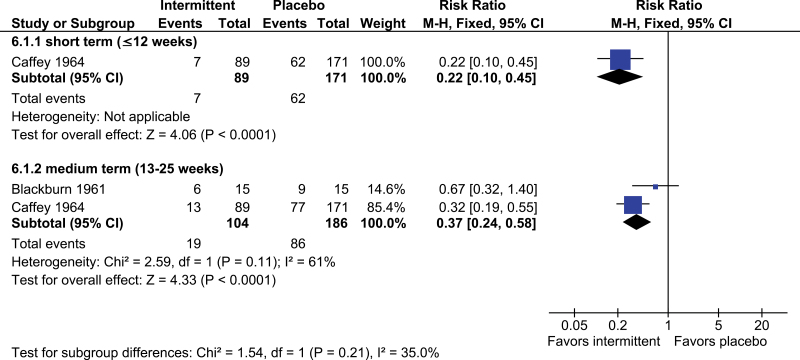Abstract
Intermittent drug techniques refer to the “use of medication only during periods of incipient relapse or symptom exacerbation rather than continuously.” The aim is to reduce the risk of adverse effects of antipsychotics by “reducing long-term medication exposure for patients who are receiving maintenance treatment while limiting risk of relapse,” with a further goal of improving social functioning resulting from the reduction of antipsychotic-induced side effects. We reviewed the effects of different intermittent drug techniques compared with maintenance treatment in people with schizophrenia or related disorders. We searched The Cochrane Schizophrenia Group Trials Register (April 2012) and supplemented this by contacting relevant study authors and manually searching reference lists. All relevant randomized controlled trials (RCTs) were included.Of 241 records retrieved by the search, 17 trials were included. Homogenous data demonstrated that instances of relapse were significantly higher in people receiving any intermittent drug treatment in the long term (n=436, 7 RCTs, RR=2.46, 95% CI=1.70– to 3.54). Intermittent treatment was shown to be more effective than placebo, however, and demonstrated that significantly less people receiving intermittent antipsychotics experienced full relapse by medium term (n=290, 2 RCTs, RR=0.37, 95% CI=0.24–0.58). Intermittent antipsychotic treatment is not as effective as continuous, maintained antipsychotic therapy for preventing relapse in people with schizophrenia. It does seem, however, significantly better than no treatment.
Key words: schizophrenia, intermittent, meta-analysis
Background
Antipsychotic medication is the mainstay of treatment for schizophrenia and is generally regarded as highly effective, especially in controlling positive symptoms, but, for a variety of reasons, the drugs are not easy to take for long periods of time. Intermittent drug techniques refer to the “use of medication only during periods of incipient relapse or symptom exacerbation rather than continuously.” The aim is to reduce the risk of adverse effects of antipsychotics by “reducing long-term medication exposure for patients who are receiving maintenance treatment while limiting risk of relapse,” with a further goal of improving social functioning resulting from the reduction of antipsychotic-induced side effects.
Objectives
To review the effects of different intermittent drug techniques compared with maintenance treatment in people with schizophrenia or related disorders.
Search Methods
We searched The Cochrane Schizophrenia Group Trials Register (April 2012) and supplemented this by contacting relevant study authors and manually searching reference lists.
Selection Criteria
All relevant randomized controlled trials (RCTs) were selected.
Data Collection and Analysis
At least 2 review authors selected trials, assessed quality, and extracted data. We calculated risk ratios (RR) and 95% CIs of homogeneous dichotomous data and estimated the 95% CI around this. For nonskewed continuous endpoint data extracted from valid scales, we estimated the mean difference (MD) among groups with a 95% CI. Where data displayed heterogeneity, these were analyzed using a random-effects model. Skewed data were presented in separate tables from meta-analysis. We assessed overall quality for clinically important outcomes using the GRADE approach. GRADE tables provide outcome-specific information concerning the overall quality of evidence from each included study in the comparison, the magnitude of effect of the interventions examined, and the sum of available data on all outcomes we rated as important to patient care and decision making.
Results
Of 241 records retrieved by the search, 17 trials conducted between 1961 and 2011, involving 2252 participants with follow-up from 6 weeks to 2 years, were included. Homogenous data demonstrated that instances of relapse were significantly higher in people receiving any intermittent drug treatment in the long term (n = 436, 7 RCTs, RR: 2.46; 95% CI: 1.70–3.54, moderate quality evidence). Intermittent treatment was shown to be more effective than placebo treatment, however, and demonstrated that significantly less people receiving intermittent antipsychotics experienced full relapse by medium term (n = 290, 2 RCTs, RR: 0.37; 95% CI: 0.24–0.58, very low– quality evidence; figure 1). Hospitalization rates were higher for people receiving any intermittent drug treatment by long term (n = 626, 5 RCTs, RR: 1.65; 95% CI: 1.33–2.06, moderate- quality evidence). Results demonstrated little difference in instances of tardive dyskinesia in groups with any intermittent drug technique vs those on maintenance therapy, with equivocal results (displaying slight heterogeneity) at long term (n = 165, 4 RCTs, RR: 1.15; 95% CI: 0.58–2.30, low- quality evidence).
Fig. 1.
Intermittent drugs vs placebo: relapse.
Conclusions
Intermittent antipsychotic treatment is not as effective as continuous, maintained antipsychotic therapy for preventing relapse in people with schizophrenia. It does seem, however, significantly better than no treatment. For full details, please see Sampson et al.1
Reference
- 1. Sampson S, Joshi K, Mansour M, Adams CE. Intermittent drug techniques for schizophrenia. Cochrane Database Syst Rev. 2006; 4:CD006196;10.1002/14651858.CD006196 [DOI] [PMC free article] [PubMed] [Google Scholar]



